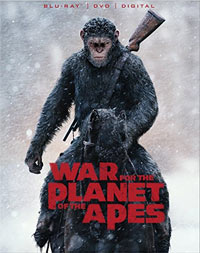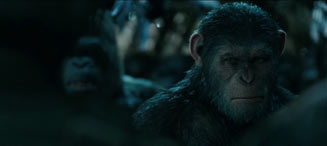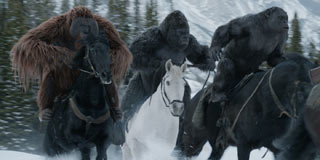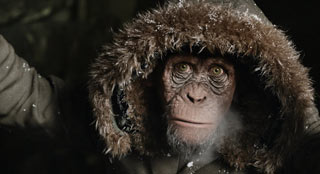

 - for sequences of sci-fi violence and action, thematic elements, and some disturbing images.
- for sequences of sci-fi violence and action, thematic elements, and some disturbing images.
After the apes suffer unimaginable losses, Caesar wrestles with his darker instincts and begins his own mythic quest to avenge his kind. (from IMDB.com)

When the inevitable reboot happens, it's unusual when the new entry not only spawns subsequent films, but that they're actually very good. Even more unusual is when each succeeding entry into the revived franchise is arguably better than the one before it. For the new prequel trilogy to the original 1968 film, Planet of the Apes, Fox has taken a serious new approach to a popular series that had spawned its own batch of sequels that varied in quality. But this new prequel series has been a well-planned out and thoughtful trilogy that is worthy of the attention of any fans of the 1968 original or science fiction in general.
It's a unique idea to theorize just how (Spoiler alert to the 1968 original!) the Earth was taken over by apes. 2011's Rise of the Planet of the Apes took a look at the dangers of experimentation -- not only on animals, but the carelessness of creating viruses in the effort to cure human diseases. The film followed James Franco's character Will, a scientist trying to cure Alzheimer's disease (which his father suffers from), and his experience with one of the test serums having enhances the brain functions of a test chimp. An accident in the lab causes the program to get shut down, so Will ends up raising a baby chimp himself at home, studying his subject closely for several years. His father gives the animal the name Caesar, and the ape grows into quite an impressive animal, but he's an extremely smart--and dangerous--ape to keep cooped up in a house attic. A domestic incident causes Caesar to be locked up in some kind of ape confinement, which eventually leads to Caesar growing bitter and rallying his kind and exposing them to the same virus that gave him his enhanced intelligence. The team of apes then escape the facility and head to the nearby Redwood Forest. As they make their way across the Golden Gate bridge, a battle breaks out, but they eventually get to the other side. Unfortunately, we soon learn that the virus that made the apes intelligent is actually deadly to humans, and it spreads quickly around the world, decimating the human population. In 2014's Dawn of the Planet of the Apes, a decade has passed since the events of "Rise," and the apes start to think the humans have died off. But a small group of survivors collide with the apes in an effort to find a new power source, and a bitter clash between the two species erupts. Both factions are split within itself between those who want to destroy the others and those who want peace. Caesar remains in power among the apes, but he soon has to deal with a threat from within, Koba - an ape who wants nothing more than to destroy the humans. After the two eventually come to blows with Caesar coming out on top, both the humans and apes realize war is coming, and there isn't anything they can do to stop it.

War for the Planet of the Apes takes place a couple years after Dawn. The land is war-torn and Caesar has been in hiding in an effort to keep his family safe. But like before, trouble seems to find Caesar no matter where he is, and soon a militant faction is trying to hunt down and cut off the leader of the apes. Andy Serkis reprises his role for a third time as Caesar, turning in his most emotional and deep performance as Caesar yet. Rise had a rich human element to the story, while Dawn really began developing more of the ape characters on their own, even showing the story mostly from their perspective (whereas Rise had largely followed Will before passing the spotlight to Caesar). War opens from the perspective of human soldiers attacking the apes, but quickly shifts over to their perspective once again, following the apes as the core of the tale, and carrying it through to resolution. Back again is one of my favorite characters, Maurice, an orangutan brilliantly performed by Karin Konoval. Maurice has been by Caesar's side since Rise and he continues to be moral support and a guide to Caesar in War. The story takes its time to get us emotionally invested in these characters once again, majoring on character and minoring on the "war" part of the story. After tragedy strikes Caesar's family, he goes on a mission of vengeance, determined to track down The Colonel, played by Woody Harrelson, and hopefully stop his faction from interfering with his kind ever again. The film then shrinks down to follow just Caesar and a core group of his friends as he sets out on this quest. But this act poses appropriate moral questions--like how is what he's doing any different than what Koba did previously (which Caesar was against)--and forces Caesar to question everything he believes in. Along the way, they meet a young girl who cannot speak, which they dub Nova (sound familiar?), and a former zoo ape nicknamed "Bad Ape" who is wonderfully played by Steve Zahn to provide some much-needed comic relief for the otherwise tense and taught story.
I'm not a Woody Harrelson fan--and honestly, I was less than excited to see he is the central human character this time around--but I was really impressed with his performance in this movie. Harrelson and Serkis play off each other greatly, proving once again that this trilogy has some of the best actors who truly deliver. Some may find certain aspects of the story too slow or even boring, but Reeves' direction and the audience's investment in the characters keeps the film engaging even when it slows up a bit. I was surprised to see a couple more prison-based sequences in this story, which is a bit of a callback to Rise, but it doesn't comprise so much of the film that it detracts. Still, War for the Planet of the Apes is light on the "war" part, but the film has a satisfying conclusion that feels fitting. The special effects have to be mentioned, as well. The motion capture technology was truly something to sit up and take note of for Rise of the Planet of the Apes, and looking back, it isn't quite as good today as it was then, but it was certainly a technological advancement. Things improved for Dawn even more, but with War, it's truly an impressive feat. The detail in the way the apes are rendered is just incredible. And this is the perfect example of technology serving the story instead of the story revolving around the technology.

The content for War is on par with the previous films in the series, although the profanity use is at an all-time low for the trilogy, with just 2 uses of "h*ll" and a couple (unfortunate) uses of blasphemy. Otherwise, the film has plenty of battle-driven violence between humans and apes, and some amongst the apes. One of the more disturbing sequences have the apes finding a few dead bodies in the snow with blood from their bullet wounds showing through the snow. The apes investigate the bodies and lift the hoods covering their faces to find bloodied human faces beneath the snow. One of them springs to life when they do this and is bleeding to death from their wounds. In a later sequence, a character shoots themselves off screen. There are also other disturbing visuals, like apes strung up on wooden X's like a crucifixion, other apes kept prisoner and whipped, and still others forced to do manual labor or falling victim to battle sequences.
Overall, War for the Planet of the Apes is a worthy conclusion to a journey that began six years ago. I haven't seen the 1968 original film in quite some time, but I'd be curious to see how it plays out after seeing this new trilogy. I'd almost be interested in seeing a remake of it in this style, though. Regardless of where the Planet of the Apes series goes from here--if at all--this prequel trilogy has been a real surprise and a welcomed reimagining of the mythos that is Planet of the Apes.
- John DiBiase (reviewed: 7/17/17)
Deleted Scenes (23:13) - There are 10 deleted scenes with optional director commentary and a Play All option. Most of the scenes have unfinished background effects and/or feature the apes in their original human actor form, wearing gray motion capture suits. The first scene, "Graveyard," shows Caesar and his friends on horseback when they find a burial site on a beach. "Turncoats" shows soldiers around a campfire being served by apes (and it is mistreated). "Barrier Wall" show some enslaved apes finding ape skulls mounted on stakes within the walls of the military compound. “I Owe You One” features the soldier named Preacher advising a captive Caesar. “A Great Man” is a follow-up to that scene, where Caesar tries to turn Preacher against the Colonel, who gets angry and defends him (using the "F" word in the process). “Do Not Lose Hope” shows Caesar using sign language to communicate to captive apes, telling them to not lose hope. In an act of encouragement to them, he steals a key to ensure their escape. In "Snowfall," Bad Ape and Nova are in awe when they discover it is beginning to snow. "The Colonel's Speech" is a lengthy rally speech from Colonel to his troops. "Malcolm and the Dinosaurs" is the longest of the deleted scenes. Colonel, while stumbling around drunk, happens upon Caesar's cage and rants on, mentioning that a man named Malcolm (from Dawn of the Planet of the Apes) had tried to convince the Colonel that he needed to find Caesar to reason with the apes. Colonel then admits to shooting Malcolm to silence his ideas. “I am Like Koba” features finished ape animation and is an emotional moment between Caesar and his friends.
Waging War for the Planet of the Apes (29:37) - This is a great making-of featurette that talks about how the story came together. The filmmakers watched all kinds of acclaimed war movies to draw inspiration for the final act in this new trilogy. They realized that war was just the backdrop for those movies, with character drama being central. Here they also touch on Caesar's story arc, Woody Harrelson's character, Nova's character, the film's sets, creating explosions, and setting up the war.
All About Caesar (12:39) is all about the central character in this trilogy. It covers Andy Serkis talking about deciding to take the role, and the way the character evolves over the three films. Caesar is likened to Moses delivering his people to the promised land. They also talk about the end of the film and the end of Caesar's story.
Weta - Pushing Boundaries (10:35) - When Weta worked on the effects for Rise of the Planet of the Apes, it was impressive then. But this new technology shows how amazing things have gotten over time since even the 2011 film.
Music for Apes (6:19) - This featurette opens on Matt Reeves' birthday for an inside look at scoring the film in the studio. It then shows composer Michael Giacchino talking to percussionist Emil Richards who just so happened to work on the original 1968 Planet of the Apes film! Michael and Matt talk to Emil about their experiences with the franchise as kids. They reveal here that they've brought back the ram's horn and metal mixing bowls and other unique instruments used to make the film's music back in the late 60's. It's such a labor of love.
Apes: The Meaning of It All (20:13) - The cast, crew, director, and film experts talk about the franchise, the original film, what it meant to them growing up, and what made this franchise so popular in the 60s and 70s. The featurette delves deeply into the themes of the new films as well as the original films. When they talk here about slavery and how 1972's Conquest of the Planet of the Apes had been extremely violent for its time, they show us some of the violent, unrated footage of people and apes getting shot, with copious amounts of fake blood shown splattering from the film's original cut.
The Apes Saga: An Homage (7:46) - This is a fun featurette that talks about how the new series is filled with references to the original series -- from dialog in Rise to the apes on horseback in Dawn and Nova in War.
Audio Commentary by Matt Reeves (2:20:00) - The director offers feature-length commentary for the whole film.
A Concept Art Gallery and Theatrical Trailers round out the extras offered here, while the iTunes special features offer ten cool Screen Comparisons: side-by-side shots of the actors in motion capture suits versus the final finished film. Those are certainly worth the watch, too.
- John DiBiase, (reviewed: 10/20/17)
Disclaimer: All reviews are based solely on the opinions of the reviewer. Most reviews are rated on how the reviewer enjoyed the film overall, not exclusively on content. However, if the content really affects the reviewer's opinion and experience of the film, it will definitely affect the reviewer's overall rating.
 Casey J Drops First Album in 6 Years, "The Stories We Sing Vol. 1" Casey J Drops First Album in 6 Years, "The Stories We Sing Vol. 1"Thu, 05 Mar 2026 13:46:00 EST |
 The K-LOVE Fan Awards Returns to Nashville's Opry House May 24 The K-LOVE Fan Awards Returns to Nashville's Opry House May 24Thu, 05 Mar 2026 13:35:00 EST |
 StowTown Records Releases New Album "Rise and Shine" from Sunday Drive StowTown Records Releases New Album "Rise and Shine" from Sunday DriveThu, 05 Mar 2026 13:12:00 EST |
 Mat Kearney Announces "Nothing Left To Lose" 20th Anniversary Tour Mat Kearney Announces "Nothing Left To Lose" 20th Anniversary TourWed, 04 Mar 2026 19:10:00 EST |
 We The Kingdom Celebrates RIAA Gold Certification of "God So Loved" We The Kingdom Celebrates RIAA Gold Certification of "God So Loved"Tue, 03 Mar 2026 18:40:00 EST |
 Mary-Clair Attends Lionsgate's "I Can Only Imagine 2" Premiere Mary-Clair Attends Lionsgate's "I Can Only Imagine 2" PremiereTue, 03 Mar 2026 18:30:00 EST |
 Stand41TrueGod to Release New Single "Wilderness" on All Platforms March 13 Stand41TrueGod to Release New Single "Wilderness" on All Platforms March 13Tue, 03 Mar 2026 18:20:00 EST |
 Click here All News Headlines |
Click here All News Headlines |